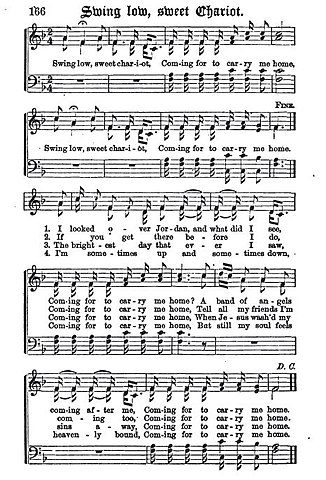|
Getting your Trinity Audio player ready...
|
20 Interesting Facts about The song, Sweet Low Sweet Chariot. We do not know who created the famous African-American spiritual “Swing Low, Sweet Chariot.” Still, it was part of the Fisk Jubilee singer’s repertoire in the 1870s and gained public attention. The Fisk University Jubilee Quartet performed the song for Victor Studios in December 1909, making it the first recorded song recording.

Left to right: Alfred G. King (first bass), James A. Myers (second tenor), Noah W. Ryder (second bass) and John W. Work II (first tenor)
“Sweet Low Sweet Chariot”
Theory #1
- “Swing Low, Sweet Chariot” was composed after 1865 by Wallis Willis, a Choctaw freedman in the ancient Indian territory of Choctaw County on the Red River of Hugo, Oklahoma.
- Willis might have been motivated by the sight of the Jordan River-like Red River by which he was toiling and the story of the prophet Elijah being carried to heaven in a chariot (2 Kings 2:11).
- Alexander Reid, a Choctaw boarding school pastor at Old Spencer Academy, heard Willis sing these two songs and transcribed the lyrics and melody.
- He sent the sheet music to the Jubilee Singers at Fisk University in Nashville, Tennessee. Jubilee singers popularized the songs while touring the United States and Europe.
History of “Sweet Low Sweet Chariot”
5. In 1939, the Nazi Music Examination Board added the song to its list of “unwanted and harmful” musical works.
6. The song revived during the 1960s civil rights struggle and folk renaissance; Several artists have done it. Perhaps the most notable performance from this period was Joan Baez’s at the legendary Woodstock Festival in 1969.
7. Oklahoma Senator Judy Eason McIntyre of Tulsa proposed a bill naming “Swing Low, Sweet Chariot” as Oklahoma’s official gospel song in 2011.
8. The bill was co-sponsored by the Black Conference. Oklahoma State. Oklahoma Governor Mary Fallin signed the bill on May 5, 2011, during a ceremony at the Oklahoma Cowboy Hall of Fame, making the song the official Oklahoma State Gospel Song.
Theory #2
9. Orne W. Work claimed that a psychic “blast” originated from the tortured soul of Sarah Hannah Shepherd, mother of Ella Shepherd, the Fisk Jubilee singer. Sarah was born in Tennessee in 1851.
10. She gave birth to Ella on a plantation. Learning that her master had sold her to another plantation and was about to separate her from her gills for good, she made a determined trip to the Cumberland River to drown herself and her daughter.
11. She was stopped by an “old mama” who warned Sarah not to “shake her lord’s chariot low.” As she reached heaven, the wise woman pulled down an imaginary scroll and prophesied that a little child would one day stand before the king and queen.
12. Following the old woman’s advice, Sarah repented, sold herself, and was taken to Mississippi. Ella performed in front of the king. She eventually reunited with her mother and lived with her in Nashville.
The Bible
13. Regardless of the song’s origins, the lyrics are believed to allude to the Biblical account of Prophet Elijah being transported to heaven in a chariot and the “Underground Railroad,” a freedom movement that assisted black people in fleeing from Southern enslavement to the North and Canada.
14. The format of the song was initially intended to be call-and-response singing, which relies on the history of African music and is still utilized often in African-American churches today.
15. Following each of the distinct lines sung by the leader, the crowd responds, “Coming for to bring me home.” The Fisk Jubilee Singers have performed the spiritual in this manner on previous group recordings. The most prevalent type of spiritual is this call-and-response performance technique.
16. There were many code meanings in the song. The southern Ohio hamlet of Ripley, one of the earliest and busiest “stations” or “depots” of the Underground Railroad, is supposed to be referenced in a coded manner in the lyrics of Swing Low, Sweet Chariot.
Sweet Low Sweet Chariot Analysis

Underground Railroad
17. Some sources say the song references the Underground Railroad. This freedom movement helped blacks escape slavery in the South to the North and Canada.
18. “Swing Low, Sweet Chariot” was a favorite spiritual of Harriet Tubman (1820-1913), who escaped slavery in 1849, and was the most famous leader of the Underground Railroad, Moses the Freedom of Slavery.
19. Widely recognized During the 1850s, she made numerous rescue trips to Maryland, helping about 300 slaves escape to freedom.
20. Rugby fans in England have also taken to singing the song and have been doing it during matches for decades.
Conclusion
The song became one of the most well-known African American spirituals because the 1909 recording greatly increased its popularity. It has been arranged by composers throughout the past century for choirs, concert soloists, jazz bands, concert bands, dance bands, and symphony orchestras. Popular musicians, including Johnny Cash and Eric Clapton, have recorded it numerous times.
Swing Low, Sweet Chariot
Lyrics
Swing low, sweet chariot
Coming for to carry me home
Swing low, sweet chariot
Coming for to carry me home
I looked over Jordan, and what did I see
Coming for to carry me home
A band of angels coming after me
Coming for to carry me home
Swing low, sweet chariot
Coming for to carry me home
Swing low, sweet chariot
Coming for to carry me home
If you get there before I do
Coming for to carry me home
Tell all my friends I’m coming, too
Coming for to carry me home
Swing low, sweet chariot
Coming for to carry me home
Swing low, sweet chariot
Coming for to carry me home
I’m sometimes up and sometimes down
Coming for to carry me home
But still my soul feels heavenly bound
Coming for to carry me home
Swing low, sweet chariot
Coming for to carry me home
Swing low, sweet chariot
Coming for to carry me home
The brightest day that I can say
Coming for to carry me home
When Jesus washed my sins away
Coming for to carry me home
Swing low, sweet chariot
Coming for to carry me home
Swing low, sweet chariot
Coming for to carry me home
If I get there before you do
Coming for to carry me home
I’ll cut a hole and pull you through
Coming for to carry me home


